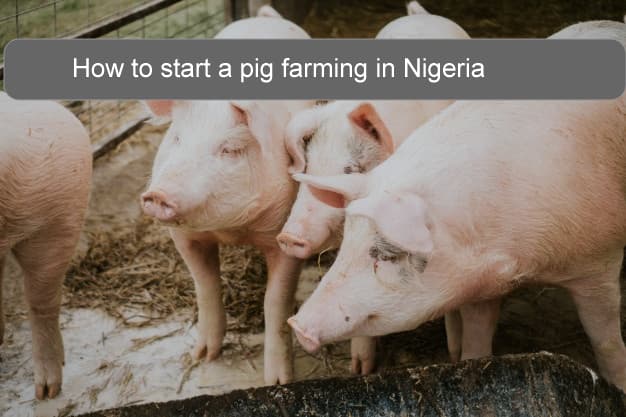Are you interested in starting a Pig farming business, then this explicit article will serve your curiosity.
Pig Farming is the act of rearing piglets or weaners till maturity for commercial purpose.
This involves getting the right piglets, vaccines and vaccination and the management of a piggery in Nigeria.
You see, as more and more Nigerians are becoming aware of the importance of becoming a business owner, more and more people are paying attention into agriculture and agribusiness, so there are more people interested in pig farming in Nigeria than ever before.
A place where pigs are raised is known as piggery or pig pen.

A normal pig will have a big head with a long snout which is strengthened by a special prenasal bone and by a disk of cartilage at the tip.
This snout is what pig use to dig into the soil to find food and is a very acute sense organ.
Pig is very popular as there are around 1 billion pigs around the world at any given time.
(Now you can see how popular pig farming is, even in Nigeria)
The biggest pig farm in Nigeria (I think in the whole of West Africa) is in Oke Aro, Ogun State.
Pigs are raised primarily for food (e.g. pork, bacon, gammon) and sometimes for their skin.
This is not to say that pig can be reared everywhere.
Pig farming is a taboo in some places i.e. Northern Nigeria, because of their religious belief against pigs, so you may not consider marketing your pigs in the northern Nigeria.
There are hundreds species of pig which include American Yorkshire, Aksai Black pied, Angeln Saddleback, Beijing Black, Bangur, Bisaro, Berkshire, wild boar, bearded pigs, and warty pigs.
These species are more common in certain geographical locations than others.
In Nigeria, we basically have local breed, foreign breed and cross-breed.
Local pig breeds are those breeds of Nigeria origin while white breeds are those breed from foreign countries.
The cross-breed are those pig’s breed gotten after a foreign male pig mate with a local female pig or vice versa.
Our company has received so many calls from people who asked, “Is pig business profitable in Nigeria?”
Other people asked even more specific question; “How profitable is piggery business in Nigeria?”
Unfortunately, there’s no straight answers to the above questions.
I know you may be disappointed, especially if you’ve read posts from other blogs, websites or Nairaland where different people give different figures.
Some people tell you, “Hey, pig farming is the most lucrative business in Nigeria”
Other people even go as far as stating figures, “If you can invest #1,000,000 in the pig production, you’ll have Return On Investment of #10M”
If you believe these people, you’re deceived.
The truth of the matter is that pig/pork production is a business (and a very serious one for that matter).
As it’s in every business, the rate of failure is higher than the rate of success. The reason is because most people are not trained to be entrepreneurs.
They simply wake up one day after they are afraid of the retirement saga and think they should start a pig business.
Most at times, these people never get any entrepreneurship training, have an experienced pig farmer as mentor or spend time to undergo a practical pig farming training.
Failure for such people is as certain as light in the day.
Back to the question of the pig farming profitability.
The truth is, anyone who gives you profitability figures on the internet is either ignorant of the pig industry or a fraudster.
The reason is because profit in any business is a factor of so many things.
The reason of the year, your geographical location, your ability to many cost, your knowledge or experience on the pig business etc.
That’s the reason why you’ll see 10 people in the same business, one of them has become a millionaire, another is struggling to pay his business bills and 8 others have failed.
Another reason why it’s out of context for anyone to write “If you invest one million naira in pig business, you’ll make three million after 2 years” on the internet is because I don’t know when you’ll be reading these words I’m writing.
Some people will be reading this post 5 years after I’ve published it.
What if I’ve stated numbers and figures? With the economy always changing and cost of things fluctuating, what happens?
But, is pig farming profitable in Nigeria?
Yes, if done with every seriousness, willingness, determination and focus.
Another question a beginner want to ask is, “How much do I need to start my pork production business in Nigeria?”
Unlike the first question (about how profitable is pig business), the question about the cost of starting a pig farm has a better answer.
First, you have to decide maybe you’re starting a small scale pig farm or a big commercial pig business.
This decision will certainly influence your planning and cost.
If you’re starting a backyard piggery, that may not require you to build a complex piggery or pig pen and you can manage every other expenses along the line.
However, if you’re starting a commercial size pig/pork production, you sure need some plots of land for the pig farm.
While I assure you that the cost of starting a pig business is easier to predict than the profitability, that doesn’t mean that you can get it on the internet.
Why You May Not Get the Pig Farming Estimate Cost Online
So many people don’t understand how the internet works so they rely on it for everything.
You think about it.
Some of the information you’re consuming about pig business on the internet was published 5-7 years ago.
So many people will take this information (including cost analyses) as gospel truth, not knowing that it was only true last 7 years.
For example, I read a blog post where a man wrote that a piglet is sold for #3,000.
While this may be true when he wrote the blog post, as at the time of writing these words, it’s misleading.
So, what do I advise you do, if you seriously need to know the cost of starting a pig farm in Nigeria?
Very simple!
Meet a practicing pig farmer and speak with him.
Since he’s a player in the pig industry, he can easily give you information that is up-to-date and current.
(If you really want to make huge money from the pig business, attend our free practical, one-on-one, on-the-farm pig farming training in any of our associates` farm near to you or get the video of the training.
Without doubt every beginner pig farmer would like to know how pigs are being sold and for what price.
The answer is simple.
Pigs are sold in KG (kilograms). Let’s say you have a grown up, castrated pig in your pig farm that you wish to sell.
The pig buyer will know how much such pig worth by weighing it on the scale.
Let’s say your pig weigh 45KG, the price for it is 45 x the market price of a KG as at the moment.
As at the time of writing this post, the price of a kilogram of pork/pig is around #450-500.
That may not be the price as at the time you’re reading this post (so you need to find out)
Pig rearing for a beginner could be both adventurous and worrisome. Among many questions is, how do I find buyers for my pigs?
What I advise you do (even before your pig grow up) is to familiarize yourself with a nearby major market.
Meet with the market women who are selling pork meant and ask them questions as per where they are getting their pork and what if you want to sell to them.
The best strategy to use here is to first buy pork from these women as this will allow them to be opened and friendly to your request.
This should be one of the major strategy in your pig business marketing plan
Let’s move to the second section of this post…
Pig farming in Nigeria
Pig rearing could be confusing for a beginner. However, if we can take you through a simple, step-by-step guide, it could be simpler for you;
- Determine the size of you intending piggery
2. Research pig market in your area
3. Hire an experienced pig farmer to build your pen
4. Get healthy piglets
5. Understand pig vaccines and vaccinations
6. Understand pigs’ diseases and cure
7. Understand pigs’ feed
8. Start small
9. Get practical pig farming training.
Determine the size of your intending pig farming business.
Just like every other thing, the planned size of your pig farm will determine every other decision, the pig pen (housing), the feeding, the labor, even the target market.
For instance, If your plan is to have a little pig farm, you may want to use somewhere at your backyard as their pen (house).
This will not be possible with a large scale piggery business in mind.
Research pig market in your area.
Some people in the business world work hard to create products, then, start looking around for the market (buyers).
That’s a big error.
The smartest thing a business minded person will do is to understand the market and market forces … even before venturing into any business.
Let me explain.
As you’re planning to start a pig farming business in Nigeria (or elsewhere in Africa), you have to consider the marketing part of your intending business
Your first assignment is to answer the question; who and who around here will buy my pigs?
Do they buy them alive or as pork?
What are the forces that determine the market demand?
Do people eat more pork at certain time?
Are there taboo or religious beliefs against pork around here?
Who are the market players now? Is there available space in your market no one is serving yet?
All of this is called marketing research.
It`s a basic step top every entrepreneurial trip… and must never be neglected, even in the pig business.
Hired an experience Pig farmer to build your pen house
Pig`s pen is an area you have to pay attention to.
Your pen has to be spacious and as neat as possible (in order to avoid insects and diseases).
To start on a medium scale commercially level, you may consider half or a plot of land.
Pigs will natural love their pen (house) to be divided into four areas:
Where they eat, where they sleep/lie (pigs love to sleep near each other), where they urinate/defecate (pigs naturally choose this themselves) and the remainder part of the pen is used to travel from one point to another, to exercise and entertain themselves.
Pigs love to congregate together, so if half a plot accommodates certain number of pigs (depending on their sizes), don’t expect that a plot of land will naturally accommodate multiply by two of what half plot accommodates… it will accommodate more… because they love to lie and be around each other, so the more pigs, the less space… to an extent.
The best practice when constructing your pigs’ pen is to make it square, not rectangular.
Though rectangular pig pen can be used, it’s not going to give you the best in your pigs` management.
It’s as well advisable to let the floor of your pen drain very well and not be clay or poorly draining floor.
This is because pigs have pointy hooves that bear much weight.
A clay soil may not cause much problem in the dry environment, but can quickly make life tough for your pigs when the environment is wet because it can cause injury, feed wastage and can contribute to illness.
Should you consider concrete pens?
Concrete pens could be used for pig farming in Nigeria.
Concrete pens are good because they alleviate the problem of mud/footing that can be caused by the clay or web floor, but also present their own problems… they hold heat during hot months and could result in joint injuries and illness.
Finally, when constructing pens in your piggery, you have to assume they are all big… market size NOW.
This is important because, when the pen is too big, more pigs can be added to the pen, but what happens when the pigs in your farm are too much than the pen?
How easy it is to break down your pen and reconstruct another one?
What some pig farmers will do is to keep their pigs in such an un-conducive environment, so making them sickly and dying… affecting the overall pig farm success.
Get healthy piglets (pig-children) for your pig farm
What will you consider before adopting a child?
Her health, her history, etc.
When planning to get your piglets, make sure you find out the best sources around you.
Your piglet must be healthy and a short history about their parents may be of good help.
Just like human, piglets are likely to take some of the traits of their parents, sickness, the number of children they bear, etc.
You also need to be sure that they have been given the appropriate vaccines.
Understand Pigs’ Vaccines & Vaccination
Just as it’s in humans and other animal husbandry, piglets and pigs are administered with vaccines, either to protect them from diseases or to heal them of them.
Pig Vaccines contain antigens from viruses, bacteria, bacterial toxins, or parasites. They are given to pigs, usually by injection, to stimulate an immune response which will protect the pigs against later natural infection with the organism from which the vaccine was derived. Most stimulate both a humoral response and a cell-mediated response.
Some of the diseases that can be eradicated by vaccines and medication are;
Mange
Atrophic rhinitis
Lice
Aujeszky’s disease (pseudorabies)
PRRS
Enzootic pneumonia
Swine dysentery
TGE
The Management of Vaccines
To effectively manage pig’s vaccines, the following steps have to be taken;
Check the expiry date.
Store in a fridge.
Monitor the temperature daily with a max/min thermometer. Freezing destroys vaccines.
Don’t overstock the fridge.
Don’t store food in the fridge.
Follow the instructions.
Ideally use a fresh needle for each pig but change at least every 5 pigs.
Do not mix vaccines or medicines.
Dispose needles in a sharps box.
Clean out syringes immediately after use.
Only use vaccines licensed in your country.
Clean bottle tops before and after use.
If you’re a beginner, just rearing pigs for the first time, you’ll sure need the help of an experienced pig farmer or a veterinary doctor to help you in the area of vaccines and vaccination.
As time goes on, you too will master everything you need to understand about pig’s vaccine and vaccination.
Understand pig diseases and the solution.
Animals get sick, just as human do. The difference is that, you may not easily know when the pigs in your farm are getting sick, except you pay attention.
Since every sickness starts with symptom, you will be good to have an experience person near you… such as a veterinary doctor.
You will be able to contact him/her at any time and say, “my pigs are looking this way”, “my pigs are not eating”, “my pigs` skin is too reddish” etc.
Aside from sickness, you will need the service of a veterinary to give appropriate vaccine whenever necessary.
Below are some of the diseases piglets, hog and pigs may encounter:
Mulberry Heart Disease (vitamin E deficiency). Though vitamin E is widespread in feed stuffs including vegetable oil, cereals and green plants, the usual problem with Mulberry Heart Disease occurs when farmers use some polyunsaturated fats diets which destroys the vitamins.
Vitamin E is very important for optimum function and metabolism of the nervous, muscular, circulatory and immune system.
Abscesses: this is the pockets of pus that contain large numbers of bacteria which enter the body through damage to the skin.
The Bacterium Actinobacillus Pleuropneumoniae (APP). Never mind if your teeth cannot pronounce any of these terms very well, your veterinary doctor understand better.
The truth is, there are tens and more diseases that can attack the herd (a group of pigs) or individual pig and you as a Nigerian pig farmer has to be prepared.
Mycotoxicosis, Agalactia, Navel Bleeding, Endometritis, Retroviruses, Erysipelas, Anaemia, Anthrax, Arthritis (joint infections), Oedema Disease, Atrophic Rhinitis (AR), Osteoporosis, Biotin Deficiency, Penis Bleeding, Brucellosis, Cystic Ovaries, Rabies, Peritonitis, Botulism, Pale pig syndrome, Blue Eye Disease, and probably 100 more.
I never intend to disturb you with all these jargons. I never intend to scare you away from pig farming either.
The truth is, many of the diseases above may just be what we should have called “headache” or “stomachache”.
Don’t be wary of their big names. Your veterinary doctor (or even an experienced pig farmer) will not see them as a threat.
Understand pig feeds
How pigs eat in the pig farm.
When it comes to how much human beings eat, it’s vary, depending on many factors… your age, your sex, the nature of your work or whether you exercise or not.
So it is with your piglets and pigs.
Some people suggest feeding your pigs twice in a day. While this may be a good standard, other factors have to be considered.
The age of your pig or piglet, the breed (specie) of your pig, amount of grass they have access to and other wild food (such as acorns) available, weather, how warm their bedding is and how much exercise they are getting.
Now, you can see how the rate and quantity of food pigs eat can vary.
But as a matter of supposition, piglets can be expected to eat 1lb of pig pellets per day for every month of their age, 2lb of pig pellets at two months, 3 lb. of pellets at three months, 4lb at four months,
Then after four months, 4lb a day should be sufficient.
Young pigs need a diet high in amino acids so that they can grow proportionately more muscle tissue, so there should be more lysine in feed for younger pigs.
After three months, young pigs could be put into adult food that will have lower levels of protein.
Too much lysine in the diet can be detrimental to growth in heavier female pigs.
Aside from concentrates (the feed you buy), you can offer your pigs other foodstuffs like grass, fruit, vegetable and other human food they eat (please, be sure they eat certain food before you`ll give them, so as not to hinder their growth especially when they are very young)
Start small.
Rearing pigs requires learning curves and every beginner needs to take his/her time.
As most things, walking slowly is the best strategy on the road you’re nor familiar with. If you’ve never rear pigs before, be sure there are many things you don’t know about pigs and their ways of life, pigs’ diseases & sicknesses and their growth rate.
“Start small” maybe the best advice I need to give you especially when you don’t know anything about pig farming and you don’t have a partner who does or an experienced consultant who can hold you by the hand.
Get practical pig farming training.
Starting a pig farm in Nigeria, as a beginner requires that you learn how the industry works, including how to make your pig farm successful.
My advice for you is to do all you can to get a practical training (on a pig farm) or employ an experienced pig farmer.
Don’t ever try to go to a battle-field without weapons.
If you know any piggery around you, visit there and seek to have an experienced pig farmer train you or act as your pig farming consultant.
Pig Farming Equipment
When it comes to equipment, there are not many things you have to worry about in the piggery business.
After your pig pen is ready, water and feeding trucks are ready, you may need few other things like bows to serve pig feed, a cool place to keep your vaccines etc.
Since you’re a beginner in the pig business, you may soon be near some people who have been in this business for a long time. They may not be aware of your newness in this line.
I think you should be aware of the following pig farming terminologies:
Pig, hog or swine: the species as a whole
Piglet or Shoat: unweaned young pig
Boar or hog: male pig of breeding age
Barrow: castrated male pig before puberty
Stag: male pig, castrated later in life
Gilt: young female not yet mated, or not yet farrowed
Sow: breeding female
Pork: the meat of the pig
Herd: a group of pigs or all the pigs on a farm
Farrowing: when pigs are giving birth
Sty: a small pig-house
Pig-shed: a larger pig-house






